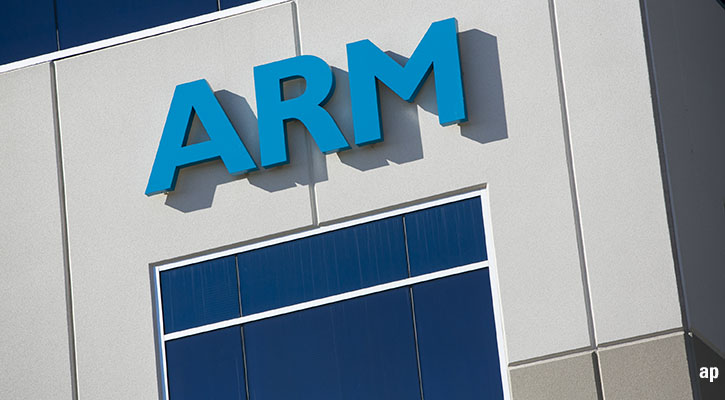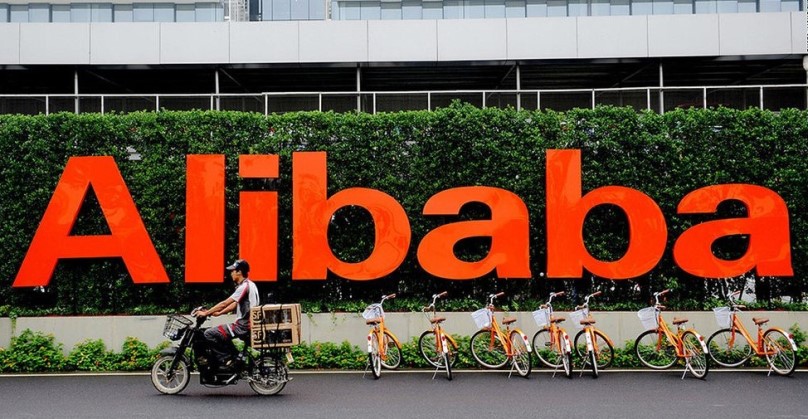
Investors have a chance to buy into the initial public offering of one of the most dominant semiconductor chip designers on the planet this week, but those shares are looking like they won’t come cheap.
SoftBank-owned Arm Holdings has an IPO trading date set for this Thursday. The UK-based company designs software for the computer chips that power smarphones, tablets, wearable technology, and even cars. It then licenses those designs to companies that make and use those chips. The company was taken private by SoftBank in 2016. After the listing, SoftBank will own 90.6% of the company’s shares. A sale to Nvidia (NVDA) was scrapped in 2022 amid regulatory concerns.
Arm’s latest public filing points to a target share price of $47 to $51. That would give the company a market value of roughly $50 billion (£40 billion) and make it the largest IPO since electric truckmaker Rivian (RIVN) debuted in 2021.
“From a valuation point of view,” says Javier Correonero, an equity analyst at Morningstar, the stock looks “very, very expensive.”
“Everything would have to go beyond perfect for them to be able to justify that $50 billion valuation,” Correonero says.
Arm is also contending with significant geopolitical uncertainty thanks to its operations in China, analysts say.
Media reports Monday morning indicated that the company is expected to price at the top or even above its target range on Wednesday. Its American depositary shares will begin trading on the Nasdaq composite on Thursday. The company does not intend to pay a dividend.
The broad adoption of Arm’s technology gives the company “a very solid competitive position,” says Correonero.
According to the company’s own estimates, Arm’s chip architecture was present in 99% of the smartphones in the world in 2022. The company says more than 30 billion Arm chips were shipped in the fiscal year that ended in March 2023, and more than 250 billion chips have been shipped since the company’s inception.
The company’s list of potential investors and users of its technology is a who’s who of tech giants, including Intel (INTC), Nvidia, Apple (AAPL), Alphabet (GOOGL), Samsung, and Advanced Micro Devices (AMD), to name a few.
“They’re a technology leader,” says Nick Einhorn, director of research at Renaissance Capital. “They’ve done very well in a lot of use cases, particularly smartphones.”
Arm’s market share is so dominant that they basically “are the market,” Einhorn says, adding that Arm will “certainly” benefit as demand for CPUs continues to expand.
Of course, this also means that it will be difficult for Arm to gain more market share, and much easier to lose it. Analysts say an open-source chip architecture called RISC-V has the potential to cut into Arm’s market share down the road.
In its registration statement with the Securities and Exchange Commission, Arm highlighted several risks to its business. Chief among these, according to Morningstar’s Correonero, is its exposure to China.
Arm’s operations in China are handled by Arm China, which is now an entirely separate entity from the main company. Nearly a fourth of Arm’s revenue came from Arm China, which Arm does not control, in the 2023 fiscal year. Ongoing geopolitical tensions between the US and China surrounding the distribution of semiconductors could also impact Arm’s operations.
“It’s a strong business, but there’s a decent degree of uncertainty,” Correonero says.
Correonero also points out that weaknesses in financial reporting disclosed in the company’s most recent filing could be an issue down the road.
Arm’s IPO Looking ‘Quite Expensive’
In the most recent fiscal year, Arm generated $2.7 billion in revenue and net income of $524 million, down about 4.5% from net income of $549 million in the previous fiscal year.
Correonero says the firm is growing in the “high single digits” and while Arm is profitable, it is less so than before it was taken private by SoftBank in 2016. He attributes the decline to a significant uptick in spending on research and development.
With a target valuation of roughly $50 billion, Correonero expects Arm stock to trade at a multiple of about 20 times revenue.
That would make the stock “quite expensive” compared with its competitors, a number of whom are growing more than triple Arm’s rate but trading at multiples closer to 12 or 15 times sales. Nvidia is also trading at a 20-times multiple that’s comparable to Arm’s, but experts expect that company to grow at a rate of about 100% this year. Nvidia also has a much more expansive variety of business operations compared with Arm.
Arm is “not a fast-growth company anymore,” Renaissance Capital’s Einhorn says, and that may affect how excited investors are about the listing and how much they are willing to pay for shares.
That said, the likelihood that Arm will be a relevant company over the next decade-plus is “quite high,” Correonero says, thanks to its strong competitive position, cutting-edge technology, and long-term relationship with its clients.






:quality(80)/cloudfront-us-east-1.images.arcpublishing.com/morningstar/KEGKFRO24VF67PWV7V2ADNG37U.png)
:quality(80)/cloudfront-us-east-1.images.arcpublishing.com/morningstar/A22UNXL3RZHWTD33LIGKUHNAH4.jpg)















